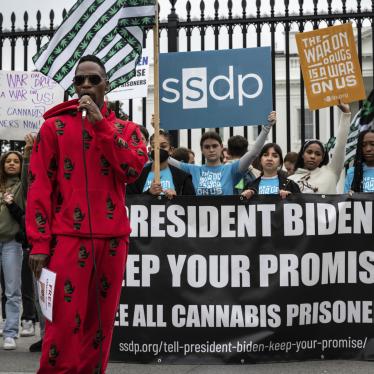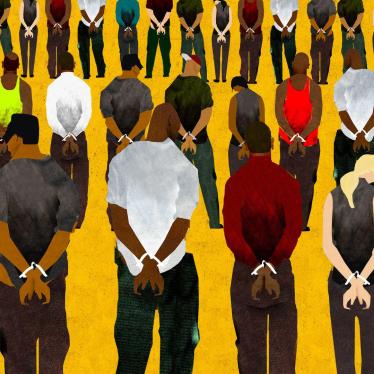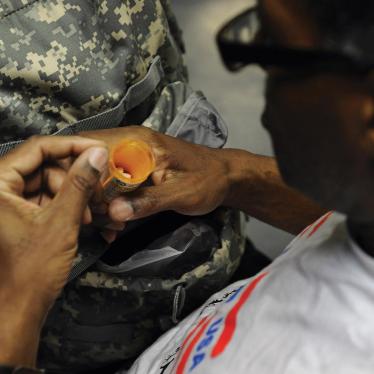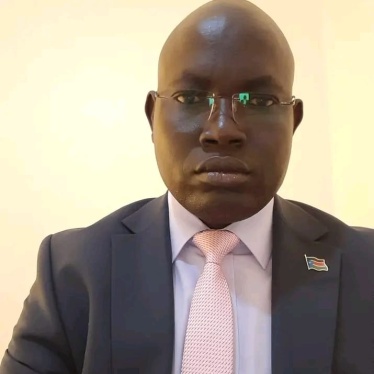Today is National Weed Day in the United States. That may prompt chuckles among many, but, as lighthearted as much of today’s commentary may be, U.S. marijuana policy is no laughing matter.
In the U.S., marijuana is the subject of harsh federal and state laws criminalizing use, possession, production and distribution. The costs of these policies, not only in terms of the billions of dollars devoted to enforcing them, but also in harm to human lives, are staggering.
The U.S. has the largest reported prison population in the world, with an estimated 2.3 million people behind bars. More than 50% of federal prisoners are serving time for drug offenses. Out of 1.3 million people in state prisons in 2013, 210,000 were imprisoned for drug offenses; of those, nearly 50,000 were there only for possession.
In New York City, Human Rights Watch documented that between 1996 and 2011, police made more than half a million arrests for possessing small amounts of marijuana in public—more than for any other offense. City officials suggested that these arrests allowed them to identify future violent criminals, but our analysis showed this was not the case.
Rates of arrest and imprisonment are marked by stark racial disparities: African-Americans are only 13% of the US population, but they represent 41% of state and 42% of federal prisoners serving time for drug offenses. African-Americans are nearly four times as likely as whites to be arrested for marijuana possession, even though African-Americans and whites use the drug at similar rates.
The impact on those imprisoned and arrested can be devastating. A conviction not only means loss of liberty for the imprisoned person, but can have ripple effects for their family and community. Convictions can mean losing the right to vote and facing enormous hurdles to obtaining employment, housing, and food assistance. For immigrants—including lawful permanent residents—conviction for even a minor drug offense often means deportation and permanent separation from their U.S. families.
Even for those who are not convicted, an arrest can mean humiliation, detention, loss of employment, and other collateral consequences.
And then there are the costs to the U.S. criminal justice system itself, as police, as well as overstretched prosecutors and courts, spend time, money and energy pursuing low-level drug offenses that could otherwise be used on more serious crimes.
Current U.S. drug policies emphasizing criminalization of the drug trade have also had devastating consequences outside the country, including by dramatically enhancing the profitability of illicit drug markets and fueling the growth and operations of groups responsible for large-scale violence and corruption in countries from Colombia and Mexico to Afghanistan.
Proponents of criminalizing drug use often argue that it is necessary to keep people from harming themselves or others. But imprisoning people who use drugs restricts their autonomy and rights to privacy, while doing little to protect them. Instead, fear of law enforcement can drive people who use drugs underground, deterring them from getting health services and increasing the risk they face of violence, discrimination, and serious illness.
There are better ways to protect people who use drugs, including by offering substance abuse treatment and social support. And governments can criminalize negligent or dangerous behavior (such as driving under the influence) to regulate harmful conduct by people who use drugs without criminalizing drug use itself.
The good news is that, increasingly, U.S. states are waking up to the costs of current harsh drug policies, and trying out new approaches—at least regarding marijuana. Four states have legalized the drug. Dozens have legalized it for medicinal purposes. In 2013, Attorney General Eric Holder issued guidance for federal prosecutors that would allow US states to legalize marijuana, noting that a regulated market may further federal priorities of combatting organized crime. Other countries, like Colombia and Mexico, are pressing for—and even (like Uruguay and Portugal) experimenting with—alternatives to current approaches.
The U.S still has a long way to go in addressing the local, national, and global harm of its drug policies. But little by little, new ways forward will be spreading like, uh, weed.








